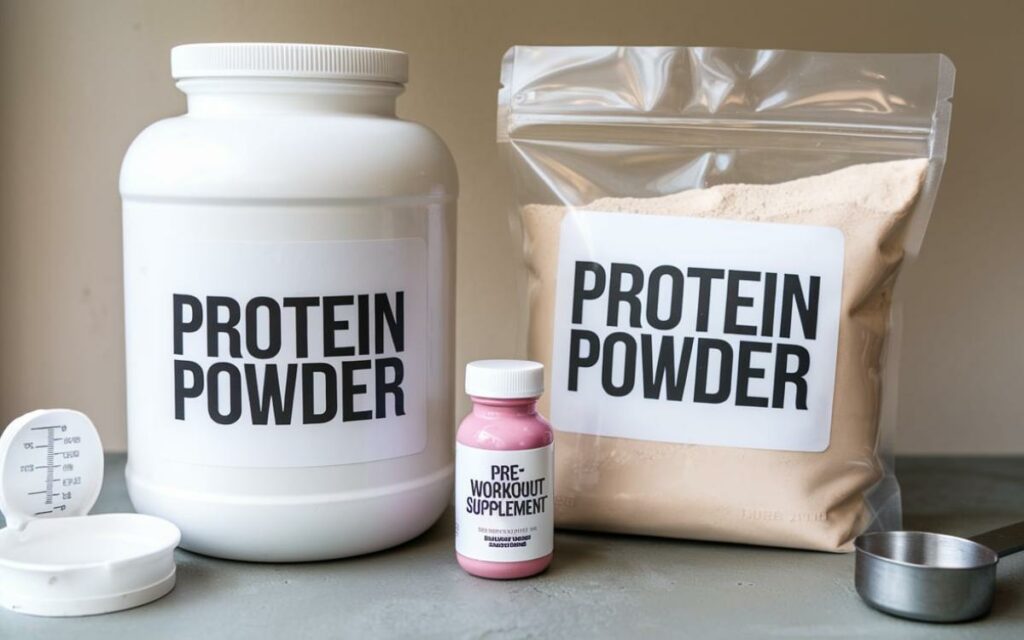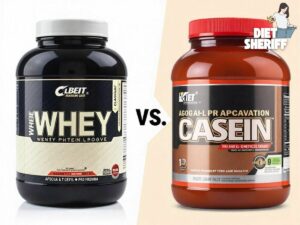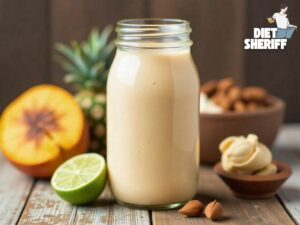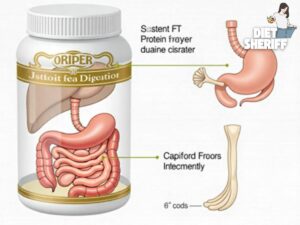With so many alternatives available, pre-workout and protein powder are two of the most popular and often-used supplements with some basic differences.
This article aims to explain the differences between protein powder and pre-workout supplements. Whether you’re looking to build muscle, boost your energy, or optimize your workouts, knowing which supplement to use and when can make all the difference.
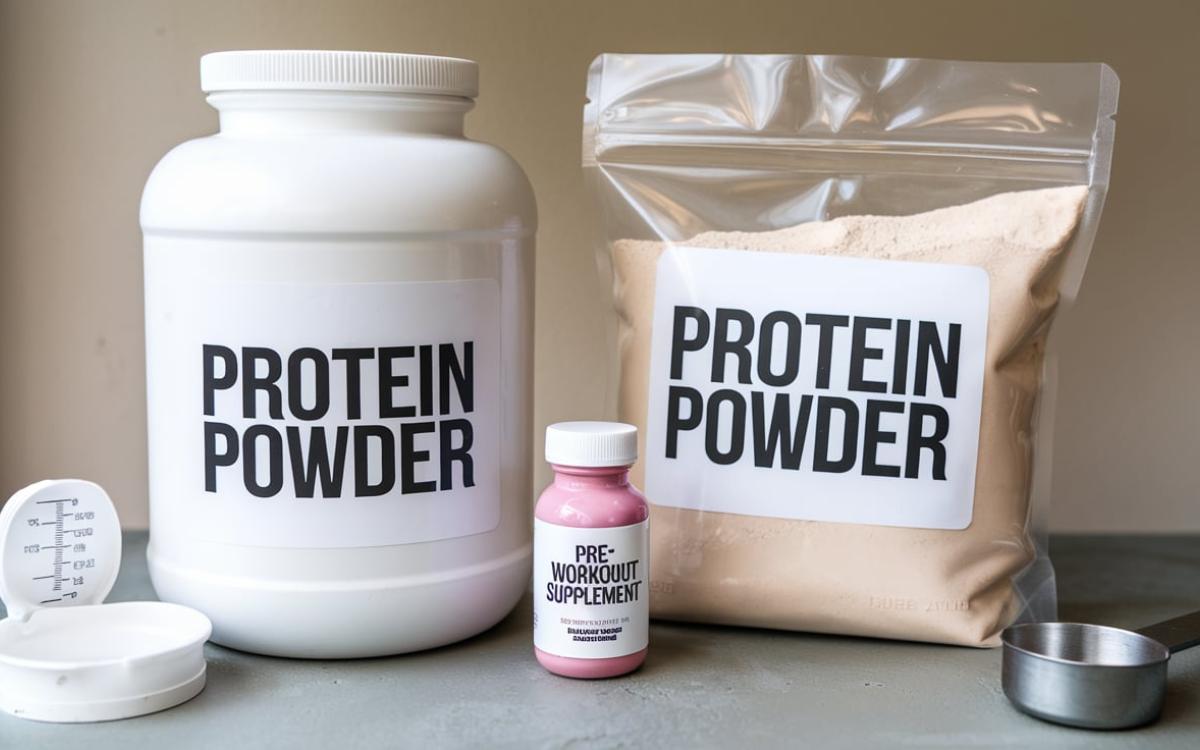
What Is Protein Powder?
Protein powder is a powdered form of protein that is commonly used as a dietary supplement. It is derived from various sources, including plants, eggs, or milk.
Many people, especially athletes and bodybuilders, use protein powder to supplement their protein intake and support muscle growth and recovery.
Related Articles: Can You Put Protein Powder in Oatmeal?
What Is A Pre-Workout Supplement?
A pre-workout supplement is a product taken before exercise to boost energy and enhance athletic performance. These supplements often contain ingredients like caffeine, creatine, amino acids, and other compounds.
People use pre-workout supplements to enhance energy, focus, and athletic performance during exercise.
Related Articles: Do Protein Powder Have Side Effects?
Difference Between Protein Powder and pre-workout
Key differences between protein powder and pre-workout supplements are given below:
- Primary Function
- Protein Powder: Recovery and Muscle Building
Protein powders are designed primarily to aid in the recovery and rebuilding of muscle tissue after exercise. They provide a concentrated source of protein, which is essential for muscle repair and growth.
By supplying the body with the necessary amino acids, protein powders help repair muscle fibers that are broken down during intense workouts, facilitating muscle growth and enhancing overall muscle mass over time.
- Pre-Workout: Performance Enhancement
Pre-workout supplements, on the other hand, are formulated to enhance athletic performance and provide a boost of energy before exercising. These supplements typically contain ingredients like caffeine, beta-alanine, and creatine, which work together to increase energy levels, improve focus, and delay fatigue.
The primary goal of a pre-workout is to maximize workout intensity and efficiency, allowing for better performance during exercise sessions.
- Core Ingredients
- Protein Powder
The core ingredient in protein powders is protein, which can come from various sources such as whey, casein, soy, or pea. These proteins supply the body with essential amino acids necessary for muscle synthesis and repair.
- Pre-workout supplement
In contrast, pre-workout supplements often contain a blend of stimulants and performance enhancers. Common ingredients include:
Caffeine: Enhances alertness and reduces the perception of effort.
Beta-Alanine: Buffers lactic acid, delaying muscle fatigue.
Related Articles: What Happens if You Drink Protein Shakes Without Working Out
Creatine: Increases the availability of ATP, the energy currency of cells, improving strength and power output.
Nitric Oxide Precursors (e.g., L-Arginine): Improve blood flow to muscles, enhancing nutrient delivery and muscle pump.
- Timing of Consumption
- Post-Workout
The timing of consumption is a critical difference between these supplements. Protein powder is most effective when taken post-workout. Consuming protein after exercise helps to kickstart the recovery process by providing the muscles with the necessary nutrients to repair and grow.
- Pre-workout
Pre-workout supplements, as the name suggests, should be taken before a workout. Typically, they are consumed 20-30 minutes before exercising to allow the body to absorb the ingredients and feel the effects right when the workout begins.
This timing ensures that the energy boost, increased focus, and enhanced endurance are at their peak during the exercise session.
Related Articles: How Often Should You Take Protein Powder?
4. Targeted Outcomes
- Protein Powder:
The benefits of protein powder are primarily realized over the long term. Consumption regularly promotes continued muscle growth and repair, which over time improves total body composition, strength, and muscular mass diet sheriff.
For anyone hoping to gain and keep muscle via regular exercise and healthy eating, it’s a necessary tool.
- Pre-Workout:
Pre-workout supplements are geared towards providing an immediate enhancement in workout performance. The stimulants and other active components aim to produce immediate effects, such as more energy, improved attention, and higher endurance.
This quick energy boost encourages people to work harder throughout their exercises, which may improve performance and hasten the achievement of fitness objectives.
5. Usage Recommendations:
- Protein Powder:
Protein powder is commonly used by individuals who exercise regularly, including athletes, bodybuilders, and fitness enthusiasts. It is often consumed as a post-workout supplement to aid in muscle recovery and growth
- Pre Workout:
Pre-workout supplements are popular among individuals who want to increase their energy levels and performance during workouts or physical activities. They are commonly used by athletes, weightlifters, and those seeking an extra boost for their training sessions.
Which ingredients separate protein powder from pre-workout supplements
The following components set protein powder apart from pre-workout supplements:
Protein Powder
High-quality protein, which is often obtained from sources like whey, casein, soy, or plant-based proteins, makes up the majority of protein powder. It’s intended to give the body the amino acids—the building blocks—it needs to repair and develop muscles.
Pre-Workout Supplements
During exercise, pre-workout supplements usually include a blend of substances that are meant to increase energy, stamina, and concentration. Caffeine, beta-alanine, creatine, citrulline, tyrosine, and taurine are often found components in pre-workout supplements.
N:B: The specific ingredients in protein powder and pre-workout supplements can vary among different brands and formulations.
Always check the ingredient list and consult with a healthcare professional or registered dietitian if you have any concerns or specific dietary needs.
Potential Side Effects
Some potential side effects of both supplements are given below:
Protein Powder Side Effects
- Digestive Issues (Lactose Intolerance, Bloating):
Whey protein powders often contain lactose, triggering digestive discomfort like bloating and diarrhea in lactose-intolerant individuals. Opting for lactose-free or plant-based alternatives can alleviate these symptoms.
- Overconsumption Risks:
Excessive protein intake, particularly through powder supplements, can strain the kidneys and lead to imbalanced nutrition. Following recommended dosages and maintaining a balanced diet is crucial to prevent health complications.
Pre-Workout Side Effects
- Jitters and Anxiety (High Caffeine Content):
High caffeine levels in pre-workout supplements can induce jitteriness, nervousness, and anxiety, especially in caffeine-sensitive individuals. Monitoring overall caffeine intake is essential to avoid these adverse effects.
- Insomnia and Elevated Heart Rate:
Stimulants like caffeine in pre-workout supplements can disrupt sleep patterns, causing insomnia. Additionally, they may elevate heart rate, posing risks for individuals with heart conditions. Proper timing and selecting low-stimulant options can mitigate these concerns.
- Dependency and Tolerance:
Regular use of pre-workout supplements can lead to tolerance, necessitating higher doses for the same effects. This dependency can impact performance and necessitate cycling off the supplement periodically to prevent reliance. Using pre-workout supplements sparingly can prevent over-reliance and maintain effectiveness.
Choosing the Right Supplement for Your Goals
In terms of choosing the right supplement for your goals following points can help you:
Assessing Personal Fitness Goals
- Muscle Gain vs. Performance Enhancement:
Determine whether your primary goal is to build muscle or enhance workout performance. Protein powder is ideal for muscle recovery and growth, while pre-workout supplements focus on immediate energy and endurance.
Explore Also:
Creativehouseblog
Gigasecurehome
Mycleanseplan
Considerations for Combining Both Supplements
- Balancing Timing and Dosage:
Coordinate the timing and dosage of protein powder and pre-workout supplements to maximize their benefits. Use protein powder post-workout for muscle repair and pre-workout supplements before training for an energy boost.
- Tailoring to Specific Workout Regimens:
Adapt your supplement regimen to align with your specific workout routines and intensity levels. Adjust dosages and timing based on the duration and intensity of each session for optimal results.

